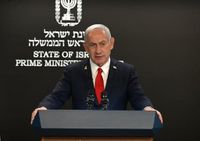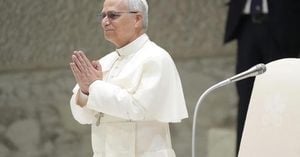On August 10, 2025, the simmering tensions surrounding Israel's war in Gaza reached a fever pitch, as families of hostages and victims of the October 7 Hamas attack called for a nationwide general strike. Their demand: halt the government’s controversial military plan to seize Gaza City and prioritize the safe return of the remaining hostages. The call, organized by the October Council—an advocacy group representing those most deeply affected by Hamas’s deadly incursion nearly two years ago—highlights the mounting public pressure on Israeli leadership and the complex, deeply personal stakes at the heart of this conflict.
At a press conference held opposite the Kirya military base in Tel Aviv, bereaved family members and activists made their appeal to the nation. "Silence kills; the time has come to bring the country to a halt," they declared, urging citizens, private companies, and labor unions to join a strike scheduled for August 17. Reut Recht-Edri, whose son Ido was murdered by Hamas at the Nova music festival, pleaded, "We will all pause next Sunday and say: 'Enough, stop the war, return the hostages.' It is in our hands." According to The Times of Israel, the strike’s goal is to "save the lives of the hostages and soldiers, and prevent further families from joining the bereaved."
The October Council’s call for a general strike comes on the heels of an Israeli cabinet decision, made on August 7, to seize control of Gaza City. The move, fiercely debated within Israel’s political and military circles, was approved despite the military’s warnings that such an operation could endanger the lives of hostages still held by Hamas and put Israeli soldiers at unnecessary risk. Families of hostages, recalling past tragedies where captives were killed as IDF troops approached, fear history may repeat itself. Anat Angrest, whose son Matan remains in captivity, voiced her anguish: "The government decided to occupy the Gaza Strip, to send soldiers to come closer to Matan. They are trying to bring him back, but in fact are endangering him." She cited a chilling precedent from last September, when six hostages were murdered in a tunnel by Hamas as Israeli forces drew near, warning that the current plan could lead to a similar outcome.
Despite the emotional pleas, the strike has not yet garnered the full support of Israel’s powerful labor federation, the Histadrut, or the main Hostages and Missing Families Forum. The Histadrut, previously barred by a Tel Aviv court from striking over political matters, stated through spokesperson Yaniv Levy that "at this stage, Arnon [Bar-David, the chairman] believes that a strike can’t help the campaign and the families’ pain." Levy added that while the organization would meet with the families to discuss possible support, "a strike is a means, not an end, when there are problems." As of August 10, the Histadrut had notified organizers it would not participate, leaving the strike’s impact uncertain.
Nevertheless, the movement received a boost from political opposition. Yair Lapid, Israel’s opposition leader, expressed his solidarity on X (formerly Twitter), writing that the hostage families’ call "to shut down the economy is justified and worthy. We will continue to stand by their side." Yair Golan, head of the left-leaning Democrats party, took it a step further, urging "all citizens of Israel" to join the strike, arguing that it is impossible to maintain business as usual while "our brothers and sisters in Gaza" remain in peril.
The government’s course of action, meanwhile, has drawn criticism from across the political spectrum. At a press conference on August 10, Prime Minister Benjamin Netanyahu acknowledged that Hamas had misled Israel during recent hostage negotiations. According to The Jerusalem Post, Netanyahu detailed Hamas’s demands: the release of Nukhba terrorists, binding international guarantees to prevent renewed fighting, and a complete Israeli withdrawal from Gaza, including the Philadelphi Corridor. These, he said, were "demands Israel would not accept." He also confirmed that Hamas had floated the possibility of releasing 20 hostages alive, but rejected any partial deals—insisting on an all-or-nothing approach that left negotiations at a standstill.
Netanyahu defended the controversial military plan to occupy Gaza City, despite objections from both his right- and left-wing critics, as well as the families of hostages. He argued that alternative strategies—such as surrounding Hamas strongholds and conducting raids—would not secure the release of captives. "The only way to return the hostages is to defeat Hamas," he maintained. "Eliminating Hamas is a condition for Israel's security and our future." He went on to frame the conflict as a pivotal moment in regional history: "We said we would change the face of the Middle East, and that is what we are doing." Netanyahu referenced Israel’s past military campaigns, including the 12-Day War and actions against Hezbollah and the Assad regime in Syria, suggesting that victory in Gaza would reshape the region’s future.
Hostage families, for their part, dismissed the government’s "day-after" plan as political theater. In a pointed statement, they accused officials of "blowing sand in the eyes of the public," arguing that the proposed conditions for Gaza’s future governance are "unrealistic" and, in practice, "mean sacrificing the hostages in captivity and risking the lives of IDF soldiers for no reason." Their frustration was echoed by the tens of thousands who turned out for protests across Israel on August 9, demanding a comprehensive ceasefire deal and a renewed focus on bringing the hostages home.
As of August 2025, the fate of the hostages remains at the center of Israel’s national debate. According to Israeli officials, terror groups in Gaza still hold 50 hostages, including 49 abducted during the October 7, 2023, Hamas onslaught. Of these, 20 are believed to be alive, while the bodies of at least 28 have been confirmed dead. The well-being of two others is a source of grave concern. Hamas is also holding the body of an IDF soldier killed in Gaza in 2014. The humanitarian toll of the conflict continues to mount, with the Hamas-run Gaza health ministry claiming more than 60,000 people in the Strip have been killed or are presumed dead—a figure that cannot be independently verified and does not distinguish between civilians and fighters.
Internationally, Hamas is under fire for its handling of the hostage crisis. Critics, including the United States, have condemned the group’s tactics as inhumane and accused it of stalling negotiations in bad faith. The U.S. recently withdrew from ceasefire talks, citing a lack of serious effort from Hamas. Meanwhile, Israel has intermittently paused fighting in Gaza to allow much-needed humanitarian aid into areas facing famine-like conditions, but the broader crisis shows no sign of abating.
With the general strike looming and families of hostages refusing to back down, Israel stands at a crossroads—torn between military objectives, public outrage, and the desperate hope of reuniting families torn apart by violence. The coming days will reveal whether the nation’s leaders can bridge these divides, or if the deadlock will deepen, with the lives of hostages and the future of Gaza hanging in the balance.





